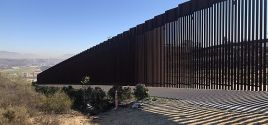Australia: Mandatory detention laws for flu sufferersBy Alexandra Kirk for AMAustralian Broadcasting Corporation Apr. 29, 2009 |
Popular 
'Sniper Seen on Roof Overlooking Pro-Palestine Protest' at Indiana University

Mike Johnson Pushes Debunked Lie That Israeli Babies Were 'Cooked in Ovens' On October 7

Axios Poll: Majority of Americans Now Want Mass Deportations

Claim Jewish Student Was 'Stabbed In The Eye' by Pro-Palestine Protester Draws Mockery After Video Released

TikTok Will Shut Down Rather Than Sell to U.S. Investors If Ban Not Overturned in Courts
 The Federal Government has increased its powers of surveillance, detention and disinfection to combat swine flu, as the number of possible Australian cases under investigation rises to 111. Health Minister Nicola Roxon says she has no intention of forcibly detaining or isolating people, but has nevertheless sought the extra powers just in case the problem escalates and authorities need to act quickly. The nation's health authorities are now trying to track down 22 Australians who were on the same plane as three New Zealand students who have contracted swine flu. Ms Roxon says Governor-General Quentin Bryce consented to the sweeping new quarantine powers for health officials last night. She says the powers range from using disinfectant on planes or at ports through to the "far more extreme" measures of "making sure that people are isolated, perhaps detained, if they don't cooperate and are showing symptoms of this disease." The powers are assigned to the Chief Medical Officer, and already exist for a raft of quarantinable diseases. Swine flu has now been added to that list. Ms Roxon insists they are reserve-like powers, sought only as a precaution, and stresses there is no reason to believe Australians will be anything other than cooperative. "It means that we can act nationally, we can act quickly," she said. "I do have to hasten to emphasise to your listeners that we are not about to take those steps, but we want to make sure that all the powers are there, that we're ready to act if this takes a dramatic turn for the worst." Ms Roxon says the names of the 22 people who were on the flight with the infected New Zealanders have been provided to the states and territories. "As I understand it there's only one person that they're uncertain of their ability to contact quickly," she said. Asked how likely it was that they could have caught swine flu because they were on the same plane as the New Zealanders she said: "I think it is still quite unlikely, but we now know that people in this situation have been travelling in areas that are at risk. "We now know that they've been on a plane with people who have the disease. It's a sensible precautionary step for us to take. "Those 22 people will be able to be tested if they're showing any symptoms of flu, but we don't have any reason yet to believe that these people have symptoms of the flu, or likely to have swine flu." Another 89 Australians showing some flu symptoms are being tested for swine flu. One third of them are in Queensland. The results should be known within 48 hours. Of the nearly 5,000 people flying into Australia from the Americas every day, only four possible cases have been identified, with one needing to be tested. And while many Asian nations are using thermal scanners at airports to detect fever in arriving passengers, Ms Roxon has defended the decision not to use them in Australia, saying at this stage it is not necessary and would cause passenger delays. "If we see the situation changing in other countries; if we find that the disease is being passed on in a more effective way, or is being particularly virulent elsewhere, we of course will reassess whether it's necessary, but our very clear advice at the moment is it would not be," she said. "And of course we take that advice seriously." |



